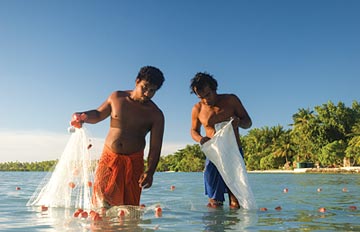Number 146 (January–April 2015)
Editorial
In the Pacific Island region, it is estimated that: 1) coastal fisheries resources provide the primary or secondary source of income for up to 50 per cent of households and 50–90 per cent of the animal-sourced protein consumed; 2) most coastal fish and invertebrate resources – at least all those accessible to coastal communities – are over-exploited or exploited to their limits; and 3) the population of many Pacific Island countries is growing rapidly and consequently the need for proteins is also growing.
There are a few alternative sources of protein: a bigger share of the offshore catch (primarily tuna) by industrial fleets could be reserved for local populations, and production from agriculture and livestock could probably be further developed, at least in high islands. But if coastal fisheries keep declining, these sources will not fill the gap, and they will not make up for the loss of income that coastal fisheries provide to communities.
A workshop dedicated to tackling these issues was convened in Noumea in early March this year. It attracted the participation of more than a 100 people: representatives from fisheries and environment departments in 22 SPC member countries, coastal communities, regional organisations and non-governmental organisations. After four days of intense discussions, the participants developed a strategy summarised in the document ‘A new song for coastal fisheries – pathways to change’ that we reproduce here (p. 37). It is a vibrant call for an enhanced focus on coastal fisheries management in the Pacific region, fully involving communities in the process.
Aymeric Desurmont
Fisheries Information Specialist
In this issue
SPC ACTIVITIES
-
Remarkable growth of seaweed farming in Bougainville (pdf: 427 KB)
-
Hands-on training in sandfish and microalgae hatchery techniques (pdf: 281 KB)
-
After 12,000 stomachs, we gain some insights on the impact of fishing on the ecosystem (pdf: 313 KB)
-
Pacific Islands flame angelfish probably all belong to the same stock (pdf: 188 KB)
-
Commercial marine aquarium surveys in Samoa (pdf: 416 KB)
NEWS FROM IN AND AROUND THE REGION
-
A review of coastal fisheries in Fiji (pdf: 213 KB)
-
Educational Managed Marine Areas (EMMAs) in French Polynesia (pdf: 5 MB)
-
WWF launches a new shark conservation initiative (pdf: 159 KB)
-
Using body language to measure your fish (pdf: 182 KB)
-
Samoa’s crown-of-thorns clean-up campaign (pdf: 148 KB)
FEATURE ARTICLES
-
Nearshore fish aggregating devices for food security in Solomon Islands
by Rosalie Masu and Joelle Albert (pdf: 823 KB) -
Clear water sharks – muddy coastal habitats
by Andrew Chin (pdf: 434 KB) -
A new song for coastal fisheries – pathways to change: The Noumea strategy
(pdf: 677 KB) -
Collective action and lime juice fight crown-of-thorns starfish outbreaks in Vanuatu
by Pascal Dumas et al. (pdf: 807 KB)



